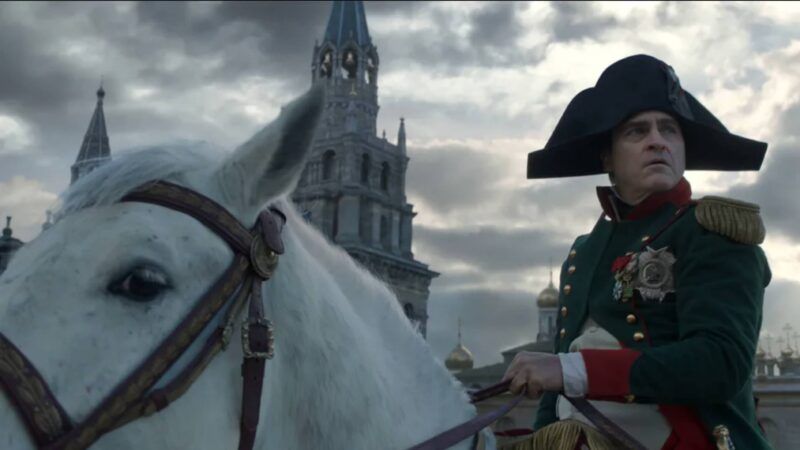In Ridley Scott's Napoleon, Political Ambition Is Both Pathetic and Horrific
The new film is an anti-epic about the petty awfulness of history's great men.

It is easy, upon hearing the words "Ridley Scott's Napoleon movie," to make assumptions about what that movie might be: a grand, lavishly-produced awards season historical epic from the filmmaker behind Gladiator that traces the rise and fall of one of European history's most ambitious, most towering figures—the tale of a legend, an icon, a living myth who once walked the earth.
In practice, however, it delivers something far stranger: Yes, it's a lavish portrait of one man's political ambition. But rather than holding up that ambition as something to be admired, it skewers its subject, casting him as insecure and outright pathetic, an awkward and ill-mannered weirdo whose psychological frailty drove him to lead battle after bloody battle, leaving millions dead in his wake. In Scott's caustic, darkly humorous portrayal, Napoleon Bonaparte wasn't an icon of greatness or a stirring legend, but a coarse and petty tyrant whose smallness nonetheless resulted in vast and meaningless brutality.
Scott's film begins with a beheading, as Marie Antoinette, the last queen of France, is taken to the guillotine in front of an audience of booing, jeering anti-royalists. But the end of the Reign of Terror is not a return to normalcy; rather, it's an opening for ambitious political strivers to sweep in and grab control. Present in the crowd is a Corsican soldier, Napoleon Bonaparte, who quickly rises through the ranks of the French military on the strength of some audacious battles. The movie's extravagantly bloody portrayal of these events, which include a shot of a cannonball exploding the chest cavity of Napoleon's horse, as well as many sequences of early artillery fire tearing through infantry, underlines the visceral barbarism of this era of warfare. The glories of European battlefields were just so many dead bodies, torn apart and left to rot on streets and fields.
Movies emphasizing the grisly horrors of period warfare have been made before, but where Scott's film breaks new ground is in its mordant portrayal of its central figure. Joaquin Phoenix plays Napoleon as a blustery weirdo, in thrall to his first wife Josephine (Vanessa Kirby), despite—or perhaps because of—her rampant affairs. His insecurities and peculiarities drive his appetites for wartime valor, for glory that never seems to be enough, as he lays waste to the continent and eventually crowns himself emperor. Phoenix's portrayal is all tics and posturing; despite his position of authority, he has trouble communicating with others, and often seems to view conversation as a vain quest for status one-upmanship, which frequently renders him ridiculous. One of the movie's best small moments comes when he's speaking with a Brit, and he practically spits out the words: "You think you're so great because you have…boats!" Phoenix's oozy, oddball performance is probably at least partially a dig at former president Donald Trump, but mainly it comes across as a swipe at those who lust for power to salve their own nagging self-doubt.
As a takedown of political ambition and wartime glory, Scott's movie is an enjoyably mean-spirited romp, much in keeping with his excellent, underrated movie about pitiable masculinity in the Middle Ages, The Last Duel. As a narrative, however, it's something of a mess. Napoleon comes across as episodic and choppy even if you aren't already aware that there's a four-hour-and-change extended cut on the way. The two-and-a-half-hour theatrical cut often feels like a miniseries cut down to feature length, and it's so intent on caricaturing its title characters that it never really explains why so many people followed him, often to their deaths, or how he was able to rise from such humble roots. But the movie's blackly comic sensibility, in which a great man of history and his political ambition are recast as both absurd and horrific, is a welcome antithesis to the sort of iconographic portrayal that so often marks historical epics. And in that way, at least, Scott's Napoleon is rather glorious.


Show Comments (60)